If you’re a new mom navigating the rollercoaster of postpartum life, chances are your plate is full — emotionally, physically, and maybe even literally. Between the sleepless nights, recovery from birth, and adjusting to your new identity, your body is healing and working overtime. One nutrient that deserves a front-row seat in your healing journey? Omega-3 fatty acids.
In this blog post, we’ll explore the incredible benefits of omega-3 for postpartum health, breastfeeding, mental clarity, and baby’s development. We’ll also answer key questions like:
- Is omega-3 needed postpartum?
- What happens to your body when you start taking omega-3?
- Does fish oil help with postpartum depression and baby brain development?
Continue reading for everything new moms should know about Omega-3.
Why Omega-3 Is Essential Postpartum
Omega-3 fatty acids — especially EPA (eicosapentaenoic acid) and DHA (docosahexaenoic acid) — are considered essential fats, meaning your body can’t make them on its own. They must be obtained through food or supplementation.
During pregnancy, your baby’s growing brain siphons large amounts of DHA from your own stores, often leaving mama depleted. And unless you’re eating fatty fish like salmon, sardines, or herring multiple times a week (and most new moms aren’t), it’s likely you’re running low.
Here’s why low omega-3 intake matters when you’re postpartum:
- DHA is crucial for your brain and nervous system. A deficiency can contribute to brain fog, postpartum depression, anxiety, and mood swings.
- EPA helps regulate inflammation and supports emotional balance.
- Both are essential for hormonal recovery, breast milk quality, and cellular repair after birth.
What Happens When You Start Taking Omega-3 Postpartum?
Many women report noticeable shifts once they begin supplementing with omega-3:
- Improved mental clarity and less brain fog
- More stable moods and less emotional reactivity
- Increased energy
- Reduced joint pain and inflammation
- Better quality breast milk for baby
And the science backs it up. Studies show that omega-3 supplementation in postpartum women can reduce the risk and severity of postpartum depression. Some even link fish oil intake with improved sleep quality and faster physical recovery (Source).
Omega-3 and Baby: Benefits During Breastfeeding
If you’re breastfeeding, omega-3s continue to play a big role in your baby’s development:
- DHA helps support healthy brain and eye development
- EPA supports immune function and reduces inflammation
- Adequate maternal intake of omega-3 is associated with higher infant IQ and better language development
Your baby depends on your stores of omega-3, so if you’re low, baby’s not getting enough either. That’s why taking a high-quality omega-3 postnatal supplement can make a big difference.
Case Study: How Omega-3 Helped Me Bounce Back Postpartum
After the birth of my second son, I found myself constantly overwhelmed, exhausted, and weepy. I chalked it up to “just postpartum hormones.” But when I finally got my nutrient levels checked, my omega-3 levels — especially DHA — were critically low.
My provider recommended a high-quality omega-3 supplement that included 625mg of DHA and 410mg of EPA daily. Within a few weeks, the brain fog started to lift. My energy improved. I felt like I could think clearly again.
The difference was so dramatic that I now make omega-3s a non-negotiable part of my daily regimen — and I recommend it to every mama I work with.
How Much Omega-3 Do You Need After Birth?
While exact needs vary, most experts recommend the following Omega-3 dosing:
- During pregnancy: At least 300-450mg DHA daily
- Postpartum (especially while breastfeeding): 600-1000mg combined EPA/DHA daily
Note: The needs are higher postpartum than in late pregnancy because lactation requires more energy and nutrient output. Omega-3s support both your recovery and your milk supply.
For proper dosing, you need labs and to meet with a postpartum specialist. Reach out to Postpartum Care USA if you need help.
What Foods Have Omega-3? (and Why They’re Not Always Enough)
Omega-3 is most concentrated in:
- Cold-water fatty fish (salmon, sardines, mackerel, cod)
- Fish oil
- Algae oil (vegan-friendly)
- Flaxseeds, chia seeds, walnuts (contain ALA, a precursor to DHA/EPA)
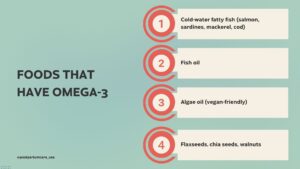
While these foods are wonderful, most women simply can’t meet their needs through diet alone. Add in concerns about mercury in fish, food aversions, and busy schedules, and supplementation becomes the most reliable option.
Omega-3 and Mood: Does Fish Oil Help With Postpartum Depression?
Yes, and here’s why:
- Omega-3s lower systemic inflammation, which is often elevated in depression.
- DHA helps rebuild the brain’s structure and support neurotransmitter function.
- EPA plays a role in serotonin balance, helping regulate mood.
Several studies show that women with higher omega-3 intake are less likely to experience symptoms of postpartum depression. Fish oil is one of the most researched natural tools in this area.
Bonus Benefits of Omega-3 for Weight, Cholesterol, and More
You may also see some added perks:
- Omega-3 and weight loss: May support fat metabolism and reduce inflammation that stalls weight loss.
- Omega-3 and cholesterol: Can lower triglycerides and support healthy HDL levels.
- Omega-3 and vitamin D synergy: These nutrients work well together to support immune function, bone health, and hormone balance.
Omega-3 Dosage and Safety
Stick with high-quality supplements that are:
- Third-party tested for purity (look for IFOS-certified or similar)
- Free of heavy metals and PCBs
- Balanced in EPA/DHA (especially high in DHA for postpartum)
Avoid fish oil with synthetic additives, fillers, or low DHA content. When in doubt, ask your provider to check your omega-3 index with a simple blood test.
Omega-3s Are a Must-Have for Postpartum Recovery
You can’t pour from an empty cup, mama. Omega-3s help refill it.
Whether you’re dealing with mood swings, brain fog, low milk supply, or simply want to give your baby the best start possible, omega-3 supplementation is one of the most impactful (and evidence-based) tools we have.
Not sure where to start? We’re here to help you choose the right omega-3 for your season of motherhood.
Want to Learn More about Our Postpartum Care Services?
Visit Postpartum Care USA’s Services to explore how we use nutrient testing and personalized protocols to support your postpartum journey — including the right balance of omega-3s, vitamins, and minerals to help you feel like yourself again.
Always consult with a healthcare professional before starting any new supplement regimen.
Pin This for Later:
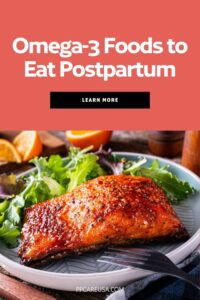
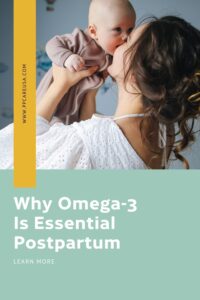
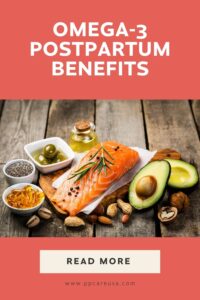
Postnatal Depletion
Meet the Team
Our Services
Supplements
A virtual healthcare clinic that helps postpartum mamas recover from postnatal depletion syndrome with a holistic approach.
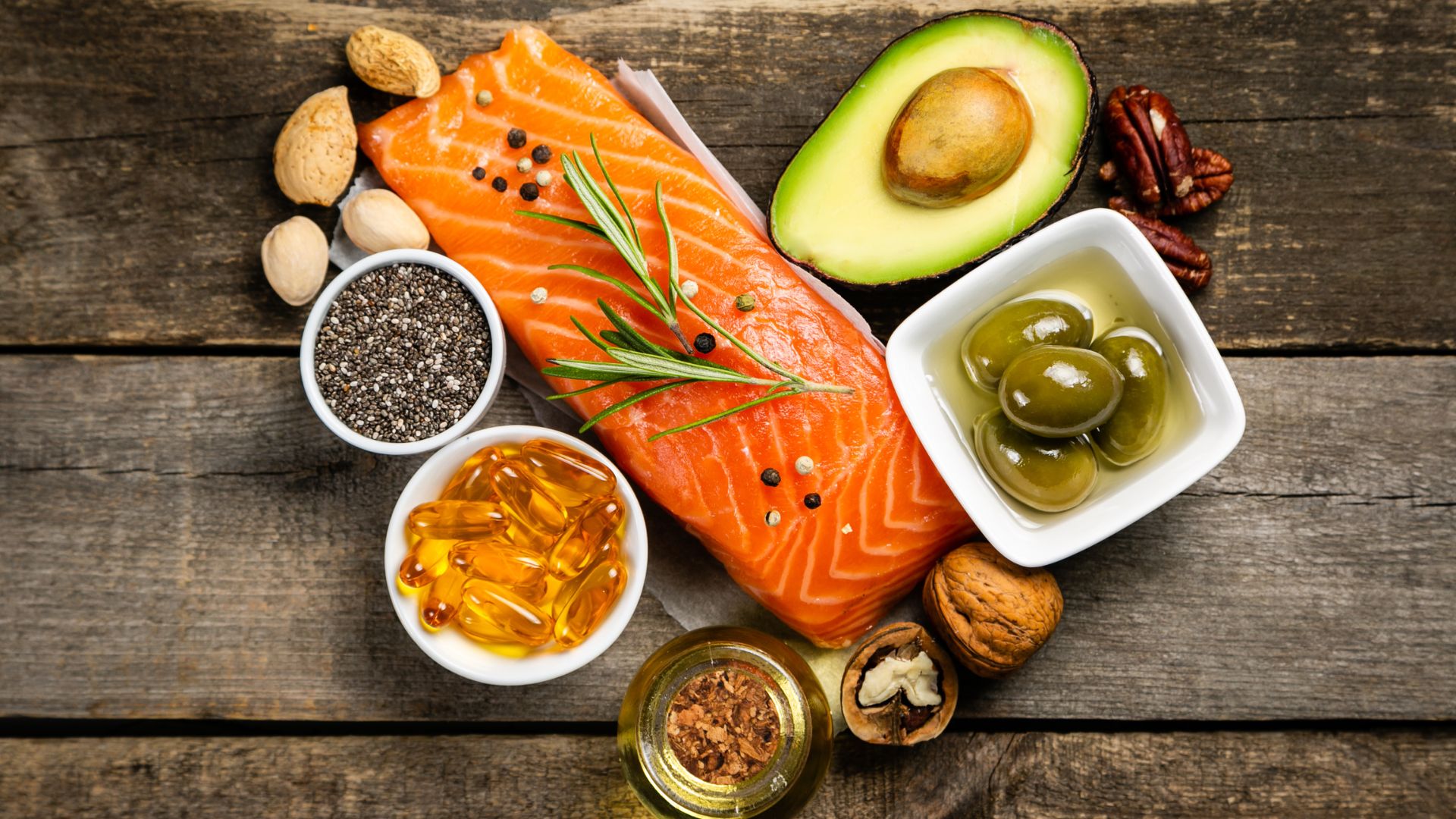
Get in touch